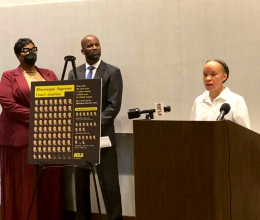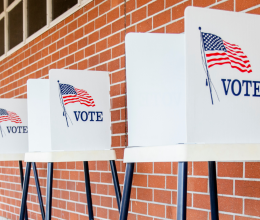Civic leaders are challenging the Mississippi Supreme Court district lines that have gone unchanged for more than 35 years, because those lines dilute the voting strength of Black residents in state Supreme Court elections, in violation of the Voting Rights Act of 1965 and the U.S. Constitution.
The American Civil Liberties Union, ACLU of Mississippi, Southern Poverty Law Center (SPLC) and Simpson Thacher & Bartlett LLP filed the lawsuit on behalf of individual Black civic leaders, including business and civic leader Dyamone White; Ty Pinkins, a 20-year Army veteran and Georgetown Law graduate; educator Constance Slaughter Harvey-Burwell; and Mississippi Senate Minority Leader Derrick Simmons of Greenville.
Mississippi’s population is almost 40% Black—a greater proportion than any other state. Yet in the 100 years that Mississippi has elected its Supreme Court, there have only been four Black justices ever to sit on that body, and never more than one at a time. It has been nearly 20 years since a Black jurist won election to the Court in a contested election. The reason for this state of affairs is that the current Supreme Court districts dilute the voting strength of Black Mississippians.
The plaintiffs are seeking to have the districts redrawn so that Black voters have an equal opportunity to elect candidates of their choice. As it stands, none of the three Supreme Court districts are drawn with a Black voting age majority. But current District 1, which includes Jackson and part of the Mississippi Delta, could easily be redrawn, consistent with traditional principles, to have a majority of eligible Black voters. Especially in light of the high degree of racial polarization in voting in Mississippi, such a change is needed to ensure that Supreme Court elections comply with federal law and allow Black Mississippians a fair and equal opportunity to elect candidates of their choosing.
Dyamone White said: “Equal opportunities to ascend to high leadership roles like State Supreme Court justice will draw in more potential leaders committed to building their lives and careers in Mississippi. As a business owner who plans to build a family here in Mississippi, I am committed to building up our State. That means creating Supreme Court district maps that give Black Mississippians fair representation and equal opportunity.”
Ty Pinkins said: “A Black citizen from the Mississippi Delta should have just as much of an opportunity to elect candidates of their choice to the Supreme Court as anyone else. And a Black lawyer from the Delta should have just as much of an opportunity to serve on the Court as anyone else.”
Constance Slaughter Harvey-Burwell said: “As an educator and a parent, it is imperative to me that our government institutions represent all of us. Our young people should be able to see themselves reflected in their representatives. That includes in the Mississippi Supreme Court.”






